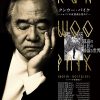I went to Sergey Babayan's recital at the Tokyo Spring Festival @ Ueno Bunka Kaikan Recital Hall on March 29, 2022.
The program was full of a heavyweight of pianistic works of the Romantic era, including Bach (arranged by Busoni) and Schubert (arranged by Liszt). The performance seemed to me to focus on the romantic feeling by, among others, emphasizing low and dark tones. All of the performances were very interesting and persuasive, but it was Rachmaninoff that was the best match for his musicality, in my view. Two technical pieces were selected from “Études-Tableaux" and "Six moments musicaux" respectively. He had a way of perceiving music on a large scale, and there is a sense in which the music is taken bar by bar rather than beat by beat. The listener feels a sense of unfathomable expansiveness. For example, in the performance of Op. 16-6, the eighth-note "so-si-la-la♭-so" form is usually heard in the foreground, but Babayan's expression is based on a larger chord-based cohesion, which gives the listener a sense of a larger musical flow.
Such a sense of large scale is possible because of the tremendous driving force and superb fingerwork. Some may associate this style with that of Marta Argerich. In fact, there are similarities between the two musicians' playing styles. The Prokofiev music they have performed together and recorded on CD is breathtakingly powerful. However, while Argerich is Latin and lucid in her expression, Babayan is characterized by dark passion and large scale. The Armenian native seems unable to express any music without digging into deep emotions.
Kreisleriana was the main piece in the second half of the program. This is a work in which Schumann expresses subtle emotional swings, which stands in sharp contrast to Rachmaninoff's Russian sense of scale and depth. His interpretation of this piece was very unique. I have heard countless performances of this piece, but his approach to all eight pieces was different from any other. At first, the agogig in the third and fifth pieces sounded rather whimsical, and the way he plays the fast passages in the first and seventh pieces is unconventional. However, in listening to the performance and ruminating over it, it becomes clear that each is an expression that inevitably springs from deep emotions within him. The melancholic emotion of Schumann's music was certainly expressed there. On the other hand, the performance of the theme of the second piece, which apparently symbolizes peace and happiness, impressed me with another side of Babayan, that of delicacy and warmth of heart. The encore was Bach's Goldberg aria (theme). The audience was moved by the exquisite expression of serenity and balance.


